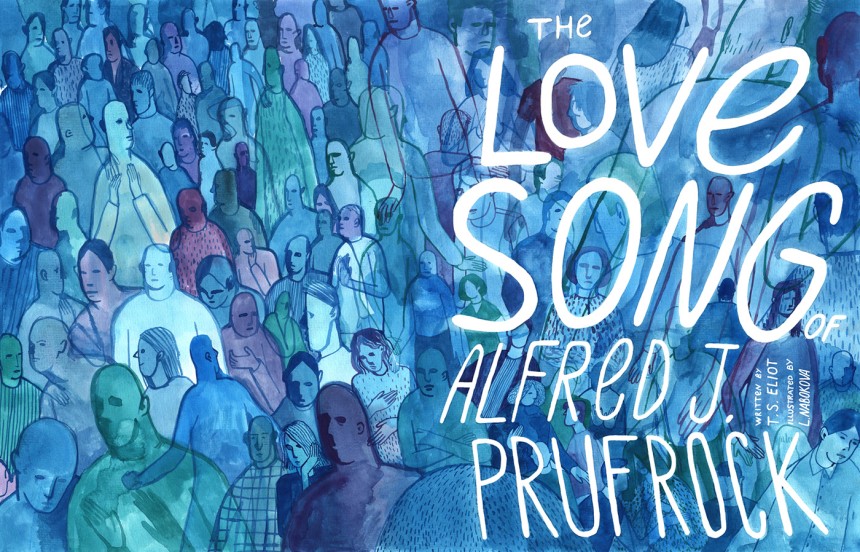
"The Love Song of J. Alfred Prufrock" by T. S. Eliot
Thomas Stearns Eliot was an American poet, essayist and playwright. His poem “The Love Song of J. Alfred Prufrock,” got attention as was seen as a masterpiece of the Modernist movement. This poem is a love confession of Prufrock, which he could not make when it mattered. Famous Pakistan's Poet Munir Niazi has conveyed a message that relates to similar feelings and what happens afterwards. This write up is an attempt to highlight the importance of love in a society.
"The Love Song of J. Alfred Prufrock" by T. S. Eliot
Thomas Stearns Eliot was an American poet, essayist and playwright. He was a leading figure in English-language Modernist poetry where he reinvigorated the art through the use of language, writing style, and verse structure. He is also noted for his critical essays, which often re-evaluated long-held cultural beliefs. In 1915, T. S. Eliot attracted widespread attention for his poem “The Love Song of J. Alfred Prufrock,” which was seen as a masterpiece of the Modernist movement.
This poem “The Love Song of J. Alfred Prufrock” is called a love song because a love confession is what Prufrock so desperately wants to say, but cannot. The poem is reflective of the generation's anxiety and indecisiveness. The speaker's anxieties and the poem's attachment to modernity are present throughout the text. The poem is a dramatic monologue whose brooding speaker relays the anxieties and preoccupations of his inner life, as well as his romantic hesitations and regrets.
This poem enchants and haunts many readers from their first reading in whatever age they may be then. Many people initially develop thoughts that the poem is about the musings and yearning of a man too frightened to declare his love. However; with passing age and gaining some maturity, the poem throws some questions to ask from ourselves as we grow older. The questions could be about the purpose of life, our place in the universe and our ineffectualness. The questions which are impossible for an ordinary person to answer but questions that haunts us all the same.
The above comments attract following response from readers of the poem:-
"However, every time I think of this poem, I cannot but see, feel, hear, the beat and rhythm of our mortal self, lost in the confusion of living life in a state of chaos. Imagined or real…all conforming to norms of society".
"How much of it we waste doing all the things, in words, actions and deeds that had we taken but a pause to ponder, we would have realized the foolishness of life without the thought of…the passage of time…death that constant companion. Regretting all we ought to have lived by but did not".
"I have a very introspective connection to this poem. I am experiencing each line with him as I read. I have learned a quality called empathy in my later years I recognized pathos and they were not present when I was younger".
Now let's read the Poem "The Love Song of J. Alfred Prufrock" itself.
Let us go then, you and I,
When the evening is spread out against the sky
Like a patient etherized upon a table;
Let us go, through certain half-deserted streets,
The muttering retreats
Of restless nights in one-night cheap hotels
And sawdust restaurants with oyster-shells:
Streets that follow like a tedious argument
Of insidious intent
To lead you to an overwhelming question
Oh, do not ask, “What is it?”
Let us go and make our visit.
In the room the women come and go
Talking of Michelangelo.
The yellow fog that rubs its back upon the window-panes,
The yellow smoke that rubs its muzzle on the window-panes,
Licked its tongue into the corners of the evening,
Lingered upon the pools that stand in drains,
Let fall upon its back the soot that falls from chimneys,
Slipped by the terrace, made a sudden leap,
And seeing that it was a soft October night,
Curled once about the house, and fell asleep.
And indeed there will be time
For the yellow smoke that slides along the street,
Rubbing its back upon the window-panes;
There will be time, there will be time
To prepare a face to meet the faces that you meet;
There will be time to murder and create,
And time for all the works and days of hands
That lift and drop a question on your plate;
Time for you and time for me,
And time yet for a hundred indecisions,
And for a hundred visions and revisions,
Before the taking of a toast and tea.
In the room the women come and go
Talking of Michelangelo.
And indeed there will be time
To wonder, “Do I dare?” and, “Do I dare?”
Time to turn back and descend the stair,
With a bald spot in the middle of my hair —
(They will say: “How his hair is growing thin!”)
My morning coat, my collar mounting firmly to the chin,
My necktie rich and modest, but asserted by a simple pin —
(They will say: “But how his arms and legs are thin!”)
Do I dare
Disturb the universe?
In a minute there is time
For decisions and revisions which a minute will reverse.
For I have known them all already, known them all:
Have known the evenings, mornings, afternoons,
I have measured out my life with coffee spoons;
I know the voices dying with a dying fall
Beneath the music from a farther room.
So how should I presume?
And I have known the eyes already, known them all—
The eyes that fix you in a formulated phrase,
And when I am formulated, sprawling on a pin,
When I am pinned and wriggling on the wall,
Then how should I begin
To spit out all the butt-ends of my days and ways?
And how should I presume?
And I have known the arms already, known them all—
Arms that are braceleted and white and bare
(But in the lamplight, downed with light brown hair!)
Is it perfume from a dress
That makes me so digress?
Arms that lie along a table, or wrap about a shawl.
And should I then presume?
And how should I begin?
Shall I say, I have gone at dusk through narrow streets
And watched the smoke that rises from the pipes
Of lonely men in shirt-sleeves, leaning out of windows? ...
I should have been a pair of ragged claws
Scuttling across the floors of silent seas.
And the afternoon, the evening, sleeps so peacefully!
Smoothed by long fingers,
Asleep ... tired ... or it malingers,
Stretched on the floor, here beside you and me.
Should I, after tea and cakes and ices,
Have the strength to force the moment to its crisis?
But though I have wept and fasted, wept and prayed,
Though I have seen my head (grown slightly bald) brought in upon a platter,
I am no prophet — and here’s no great matter;
I have seen the moment of my greatness flicker,
And I have seen the eternal Footman hold my coat, and snicker,
And in short, I was afraid.
And would it have been worth it, after all,
After the cups, the marmalade, the tea,
Among the porcelain, among some talk of you and me,
Would it have been worth while,
To have bitten off the matter with a smile,
To have squeezed the universe into a ball
To roll it towards some overwhelming question,
To say: “I am Lazarus, come from the dead,
Come back to tell you all, I shall tell you all”—
If one, settling a pillow by her head
Should say: “That is not what I meant at all;
That is not it, at all.”
And would it have been worth it, after all,
Would it have been worth while,
After the sunsets and the dooryards and the sprinkled streets,
After the novels, after the teacups, after the skirts that trail along the floor,
And this, and so much more?
It is impossible to say just what I mean!
But as if a magic lantern threw the nerves in patterns on a screen:
Would it have been worth while
If one, settling a pillow or throwing off a shawl,
And turning toward the window, should say:
“That is not it at all,
That is not what I meant, at all.”
No! I am not Prince Hamlet, nor was meant to be;
Am an attendant lord, one that will do
To swell a progress, start a scene or two,
Advise the prince; no doubt, an easy tool,
Deferential, glad to be of use,
Politic, cautious, and meticulous;
Full of high sentence, but a bit obtuse;
At times, indeed, almost ridiculous—
Almost, at times, the Fool.
I grow old ... I grow old ...
I shall wear the bottoms of my trousers rolled.
Shall I part my hair behind? Do I dare to eat a peach?
I shall wear white flannel trousers, and walk upon the beach.
I have heard the mermaids singing, each to each.
I do not think that they will sing to me.
I have seen them riding seaward on the waves
Combing the white hair of the waves blown back
When the wind blows the water white and black.
We have lingered in the chambers of the sea
By sea-girls wreathed with seaweed red and brown
Till human voices wake us, and we drown.
This poem “The Love Song of J. Alfred Prufrock” is a love confession of Prufrock, which he could not make when it mattered. One of famous Pakistan's Poet Munir Niazi has conveyed a message that relates to similar feelings and what happens after all the efforts. Here in the following; the translated version of Munir Niazi Poem in Urdu is being shared.
Munir Niazi: Cupid will Not Strike Now
Stars that shine,
In someone's eyes,
Meetings that take place,
In the midst of lightening of clouds and rains,
In those unsettling times,
It will take place in broken heart.
Love will not strike now,
It will happen a few days later.
When these days will pass,
Love will bloom in the memories.
The significance of the stated message is that love between two humans is an important aspect of each society in all civilizations. The family bonds between humans cannot originate with out love and for making strong relations, which may then results in happy progressing society. Love shapes up the dignity, honour and respect between all humans and helps garner a meaningful brotherhood for the sustenance of all societies. A man who spends his life in love is likely to enjoy fruits of good deeds in life hereafter.

Poem from Munir Niazi: Cupid will Not Strike Now
This poem “The Love Song of J. Alfred Prufrock” is a love confession of Prufrock, which he could not make when it mattered. One of famous Pakistan's Poet Munir Niazi has conveyed a message that relates to similar feelings and what happens after all the efforts. Here in the following; the translated version of Munir Niazi Poem in Urdu is being shared.
Munir Niazi: Cupid will Not Strike Now
Stars that shine,
In someone's eyes,
Meetings that take place,
In the midst of lightening of clouds and rains,
In those unsettling times,
It will take place in broken heart.
Love will not strike now,
It will happen a few days later.
When these days will pass,
Love will bloom in the memories.
The significance of the stated message is that love between two humans is an important aspect of each society in all civilizations. The family bonds between humans cannot originate with out love and for making strong relations, which may then results in happy progressing society. Love shapes up the dignity, honour and respect between all humans and helps garner a meaningful brotherhood for the sustenance of all societies. A man who spends his life in love is likely to enjoy fruits of good deeds in life hereafter.


Top SEO Company in Ahmedabad for Business Growth
In today's digital world, businesses of all sizes and industries need to maintain a strong...
Acute Hospital Care Market Forecast: Expanding Patient Care Needs
Acute Hospital Care Market Size The Acute Hospital Care Market is projected to grow from...

